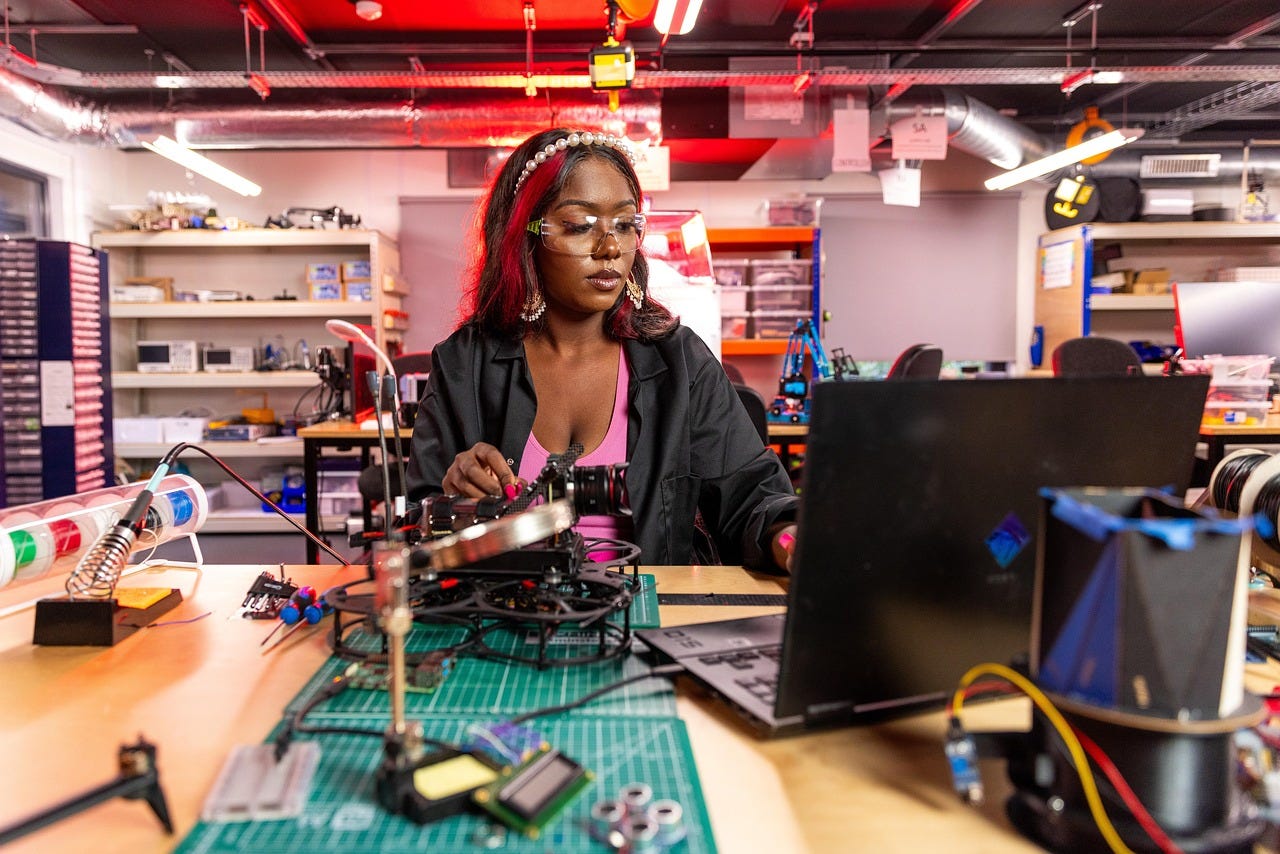If you think Robotics is not for you, you're WRONG. Let's debunk 8 common Myths holding you back
Breaking Barriers and Busting Myths About Robotics

You Are not Curious
Yes, that's it. If you have a curious mind, the possibilities are endless. Robotics is a vast and diverse field that there's always something exciting to discover or build.
The only prerequisite is curiosity.
If you're not willing to explore, question, or learn, then robotics might not be your calling. However, for everyone else, let me debunk some common misconceptions about why you think robotics might not be for you.
Myth #1: Robotics is Full of Math
Yes, some parts of robotics do involve complex mathematics, especially in areas like position estimation and navigation. But here's the good news: you get to decide how deep into the math you want to go. When I first started, math was not my strength, but I learned gradually. You can do the same. The key is to approach it step by step. Over time, what seemed like a challenge becomes manageable, and you'll be surprised at how far you can go.
Myth #2: Robotics involves Hardware, and That Scares Me
I understand this concern. I started as a computer science engineer with little to no experience in hardware. Everything I know about hardware, I picked up along the way. In fact, I know many robotics PhDs who have never touched hardware. Robotics is about collaboration, and often, teams have specialists for hardware, software, and other components. If hardware intimidates you, you can focus on other areas while working alongside those who enjoy dealing with hardware.
Myth #3: I Don't Like to Code. How Can I Build Robots?
Believe it or not, you can still be a successful roboticist even if coding isn't your thing. During my career, I worked with an electrical engineer who was brilliant at electronics but hated coding. He was highly respected for his expertise. Robotics is multidisciplinary, and there's room for everyone to specialize. If you excel in electronics, mechanics, or even conceptual design, you can make meaningful contributions to the field without writing a single line of code.
Myth #4: I Don't Know How to Design Mechanical Systems. How Can I Build a Robot?
Not all roboticists are mechanical engineers. Mechanical design can be made accessible using user-friendly tools like TinkerCAD or SketchUp, which are intuitive and easy to learn in a few minutes. For more advanced work, software like SolidWorks, Onshape, or Fusion 360 is commonly used by professionals. However, you don’t have to design mechanical parts from scratch. Many roboticists rely on prebuilt robotic kits or platforms like Clearpath’s rugged robots, such as the Husky, which can be deployed directly in the field. This approach saves time and reduces complexity, allowing you to focus on your area of interest.
Myth #5: I Am Not an Engineer
Robotics isn’t exclusive to engineers. Many technicians and practitioners in the field don’t hold engineering degrees but are skilled in assembly, testing, or maintenance. For example, some people excel at integrating and troubleshooting robotic systems without formal engineering education. Others contribute through roles like project management or operations. If you’re willing to learn and apply practical skills, you can find your niche in robotics.
Myth #6: I Am Not Technical at All. I Am an Artist/Designer
If you’re an artist or designer, you’ll be pleased to know that robotics has a thriving artistic community. The intersection of robotics and art is fascinating, and platforms like [roboticart.org](http://roboticart.org) showcase stunning projects. One example is the "Obsessive Drafter," a large mobile robotic arm that draws live portraits of people it encounters on walls. Whether it’s creating kinetic sculptures or exploring human-robot interaction through art, your creative talents can shine in this field.

Myth #7: I Am Too Old to Learn Robotics
This is a myth I hear far too often. The idea that age is a barrier to learning robotics couldn’t be further from the truth. I completed my PhD in robotics at the age of 40. I’ve met individuals who started learning robotics in their 60s or even 70s. What matters is not your age but your curiosity and willingness to learn. The field is constantly evolving, which means there’s always room for newcomers.
Myth #8: I Am Too Young to Learn Robotics
On the flip side, some believe they’re too young to start. That’s equally untrue. My daughter began exploring robotics in kindergarten using simple programmable robots from [VEX Robotics](https://vexrobotics.com). These kits engage young minds by allowing them to program robots to perform basic tasks. Robotics is an excellent way for children to develop problem-solving skills and creativity, and it’s never too early to start.
Final Thoughts
I believe I’ve addressed most of the common objections people have about entering the field of robotics. If you have a curious mind, there is always a path for you to explore. Robotics is not about fitting into a rigid mold; it’s about finding your unique place in a multidisciplinary ecosystem. Whether you’re an engineer, artist, or hobbyist, there’s a way for you to contribute.
If you’re still unsure or have additional objections, let me know in the comments. I’ll be happy to address them and help you get started. Remember, it’s never too late—or too early—to learn robotics. So get your act together and start exploring this incredible field!
Where Next
Excited to jump into robotics? Awesome! Stick around—I'll be sharing a practical guide in the next post to help you kick off your robotics journey. Let's get building!




Feeling very heard and thank you for listening to many of the questions posed earlier! Great article mate.